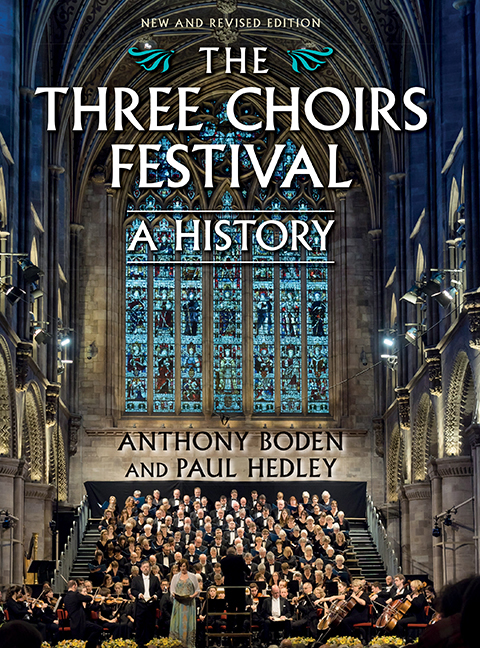Book contents
- Frontmatter
- Contents
- List of Illustrations
- Preface
- Acknowledgements
- List of Abbreviations
- List of Cathedral Organists
- 1 Origins
- 2 A Fortuitous and Friendly Proposal
- 3 A Numerous Appearance of Gentry
- 4 ‘The Musick of my Admiration Handel’
- 5 The Gentlemen and the Players
- 6 Avoiding Shipwreck
- 7 Prima voce
- 8 Favourites and Flops
- 9 Sacred and Profane
- 10 Froissart
- 11 The Unreasonable Man
- 12 The Dream
- 13 Beyond these Voices
- 14 An Essentially English Institution
- 15 The Elgar Festivals
- 16 Dona nobis pacem
- 17 Recovery
- 18 Association
- 19 A New Epoch
- 20 Jubilee
- 21 Theme with Variations
- 22 Houses of the Mind
- 23 ‘A Gold-Plated Orchestra’
- 24 A New Millennium
- 25 Reorganisation
- 26 An Invitation to the Palace
- Appendix Three Choirs Festival Timeline
- Select Bibliography
- Index
- Plate section
5 - The Gentlemen and the Players
Published online by Cambridge University Press: 11 August 2017
- Frontmatter
- Contents
- List of Illustrations
- Preface
- Acknowledgements
- List of Abbreviations
- List of Cathedral Organists
- 1 Origins
- 2 A Fortuitous and Friendly Proposal
- 3 A Numerous Appearance of Gentry
- 4 ‘The Musick of my Admiration Handel’
- 5 The Gentlemen and the Players
- 6 Avoiding Shipwreck
- 7 Prima voce
- 8 Favourites and Flops
- 9 Sacred and Profane
- 10 Froissart
- 11 The Unreasonable Man
- 12 The Dream
- 13 Beyond these Voices
- 14 An Essentially English Institution
- 15 The Elgar Festivals
- 16 Dona nobis pacem
- 17 Recovery
- 18 Association
- 19 A New Epoch
- 20 Jubilee
- 21 Theme with Variations
- 22 Houses of the Mind
- 23 ‘A Gold-Plated Orchestra’
- 24 A New Millennium
- 25 Reorganisation
- 26 An Invitation to the Palace
- Appendix Three Choirs Festival Timeline
- Select Bibliography
- Index
- Plate section
Summary
FOLLOWING the rescue of the Festival by the Duke of Norfolk in 1798, the number of Stewards rose to six, three clerical and three lay, in each city. Even so, rising costs and falling receipts placed an increasingly formidable burden upon these gentlemen. After 1817(G), when receipts exceeded expenditure and the Stewards were able to invest a surplus in consols, the Festival made a loss every year until 1853(G). In 1836 it was rumoured that at a meeting of the Worcester Stewards ‘some good round sums were offered by certain of them to be released from their impending responsibility’. This is hardly surprising: deficits in the previous decade had exceeded L750 per annum, reaching a peak of L1,365 1s. 0d. in 1832(G).
Between 1836 and 1838 three meetings took place at the Episcopal Palace in Worcester of a committee appointed ‘to consider the best means of ensuring a more enlarged and efficient support of the Triennial Musical Festival in Worcester’. The result was the setting up in Worcester of a guarantee fund amounting to L746 in which thirty-two gentlemen and members of the clergy, including the Bishops of Worcester and Rochester and three members of Parliament, agreed to subscribe the whole, or such proportions as necessary, of amounts from L5 to L20 each towards the Worcester Music Meetings. This sum, together with L50 from each of the, by then, eight Stewards was used to defray expenses, the payment from each subscriber being made in proportion to the amount of their subscriptions.
In 1844 a guarantee fund was opened in Gloucester too, but there the preferred method of raising an extra subsidy was to increase the number of Stewards. In 1847 James Henry Brown took over as secretary of the Gloucester Festival. Not only was he a first-class administrator but he also had a gift for attracting men of means and influence to the ranks of the Stewards; in 1853 there were twenty-three, in 1862 fifty-four, and by 1868 there were no fewer than 106.
- Type
- Chapter
- Information
- The Three Choirs Festival: A HistoryNew and Revised Edition, pp. 56 - 86Publisher: Boydell & BrewerPrint publication year: 2017

